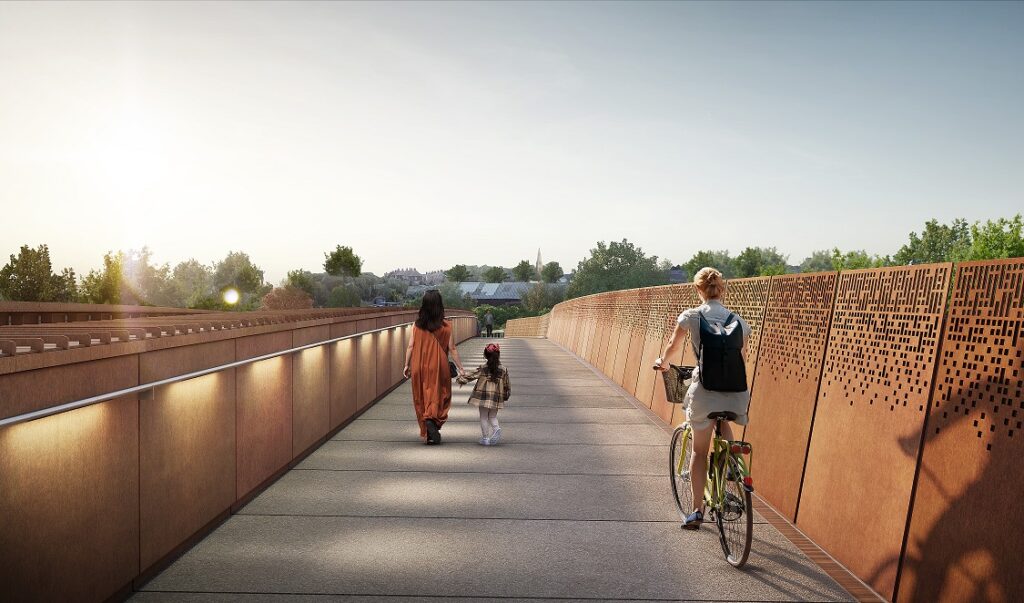
HS2 Ltd has revealed updated designs for the new Aston Church Road Overbridge that will span the high-speed rail line connecting Saltley, Washwood Heath and Nechells in Birmingham.
After initial designs were shared with the public in 2021, local feedback has inspired changes that will provide a wider walkway, creating enough space for cyclists, and an improved lighting strategy, making it safer and more environmentally friendly.
HS2’s Senior Landscape Design Manager, Steve Fancourt said:
“We want key HS2 structures like the Aston Church Overbridge to blend with the local surroundings and enhance and connect green spaces. This area of Birmingham is very urban, but we believe existing wildlife corridors, such as the Birmingham and Warwick Canal and the River Rea, can support wildlife movements and improve biodiversity.Our landscape design, incorporating community feedback, will also include native woodland trees such as silver birch, shrubs such as hazel and hawthorn, and wildflowers and grasses around the structure.”
In response to engagement feedback, with 77% of people showing a preference for LED lighting, this has now been included in an innovative and fully integrated lighting strategy. The proposal provides increased lighting levels for pedestrians and cyclists, enhancing the user experience and level of safety whist reducing light spill to trains below. This lighting design will also protect wildlife, particularly bats that may forage underneath the bridge, by decreasing overall light pollution.
Public feedback has also resulted in the stainless steel finish being replaced with weathered steel panels incorporating a perforated pattern to maximise light and views, making the bridge feel warmer and improving the pedestrian experience. The side of the bridge has also been lowered in sections to improve views.
People were also keen to see green spaces, so this has also been addressed by creating new woodland planting in the area around the bridge, including native trees, shrubs and species-rich grassland.
Nick McGough, Lead Architect for the Balfour Beatty VINCI Design Joint Venture said:
“Community feedback has been essential in developing our design for the Aston Church Road Overbridge. We have balanced challenging technical constraints in developing a robust but elegant bridge whilst seeking every opportunity to both enhance the user experience and increase biodiversity through our adjoining landscape proposals. Importantly, this bridge is a key element of wider enhancements which HS2 will provide in the locality, providing better pedestrian and cycle connectivity for the local community which will help support longer-term sustainable economic growth for the area.”
Aston Church Road Overbridge is located two miles north-east of Birmingham city centre. The original bridge has been demolished because extra space is needed for the HS2 line to pass through, and once built, the new bridge will connect to the existing road network.
The new alignment of Aston Church Road with the creation of safe pedestrian crossing points has provided an opportunity to provide a new public space in front of the local Mosque. In August 2022, a workshop was organised by HS2’s Architects Weston Williamson + Partners with participants from the community and users of Masjid Ali Ahle Sunnat Wal Jamaat Mosque, to gather ideas and identify local need to inform the community landscape area in front of the building.
This has resulted in initial designs consisting of a paved central area with seating which could act as an overspill space when the mosque is busy. It will also look to provide a cyclist crossing point providing a link directly to the Aston Church Road Overbridge and on to the wider cycle networks. The space will be surrounded by low maintenance ornamental shrub planting, species rich grassland, along with much needed tree planting to provide shading and separation from the highway.
In addition, creative ideas reflecting Islamic cultural themes such as paving with engraved calligraphy, mosaic tiles, weathered steel planters and tree grills, a seating canopy, and pillars with climbing plants, are being explored as designs develop further.
Adeel Taswar, Chairman at the Mosque said:
“We were really pleased to be involved in the workshop with HS2’s architects, which gave us a great opportunity to contribute to the design of the space outside the Mosque. Our creative ideas, such as mosaic tiles and Islamic calligraphy being incorporated, as well as making sure the space can be used for celebrations and events, have been taken on board and we’re looking forward to seeing the end result.”
